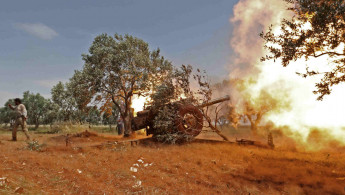Syrian rebels recapture village as punishing Idlib airstrikes by Assad regime continue
The capture on 8 May of Kfar Nabuda, a village in northern Hama at the edge of the last territory held by opposition forces in northwestern Syria, marked the first ground advance by regime forces on the rebel stronghold of Idlib since a ceasefire last year averted an earlier offensive.
The capture of the village allowed regime forces to advance to the west and north, making further territorial gains.
A long-feared full-scale ground offensive on rebel-held Idlib and northern Hama threatens to displace hundreds of thousands of civilians, many of them already refugees.
An escalation in aerial bombardments on the area by the Syrian regime and its Russian ally in the run-up to the capture of Kfar Nabuda has forced more than 180,000 people to flee their homes.
Continuing punishing airstrikes on Idlib and northern Hama have killed more than 180 civilians since the end of April, according to the Syrian Observatory for Human Rights (SOHR), and the UN says the shelling has destroyed or damaged at least 18 hospitals and clinics.
Despite the unilateral declaration of a ceasefire by regime forces on Sunday, activists reported continuing strikes.
|
|
Naji al-Mustafa, a spokesman for the fighters, said they had regained control over the village on Wednesday after overnight fighting, according to AP.
Idlib is majority controlled by the extremist Hayat Tahir al-Sham (HTS) forces, formerly an Al-Qaeda affiliate known as Jabhat al-Nusra.
The UK-based SOHR confirmed that regime forces had been repelled from Kfar Nabuda.
HTS fighters aim to gain control over all territory lost the regime in the next two weeks, Mustafa added.
The rebel's counteroffensive was met with intense regime and Russian airstrikes across opposition-held territory.
At least 18 people were killed in airstrikes on four village in towns since last Tuesday, according to SOHR.
In the town of Maaret al-Numan, the SOHR said at least 12 people were killed in an airstrike in a market, although the White Helmets put that figure at nine people.
Turkey, who alongside Russia brokered the fragile ceasefire that until this month had prevented a ground offensive but not airstrikes, said it was imperative for the regime's allies to impede the attack on Idlib.
"We have told [the Russians] the regime must be controlled. The regime's attacks must be stopped," said Turkish Defense Minister Hulu Akar, currently in talks with Russia to contain the violence. "They said they would work on it."
Despite Russia's self-crafted role as a ceasefire broker, the regime ally has participated in airstrikes against rebel-held areas.
Russia has also said rebel forces are increasingly directing their own missiles towards it Hmeimim military base in the coastal province of Latakia.
The US on Tuesday said it suspected the Assad regime had perpetrated a chemical attack in Idlib on Sunday, although the state department said it was still under investigation.
SOHR has refuted claims that a chemical attack took place on Sunday.





 Follow the Middle East's top stories in English at The New Arab on Google News
Follow the Middle East's top stories in English at The New Arab on Google News
![Israeli forces ordered bombed Gaza's Jabalia, ordering residents to leave [Getty]](/sites/default/files/styles/image_330x185/public/2176418030.jpeg?h=a5f2f23a&itok=_YGZaP1z)

